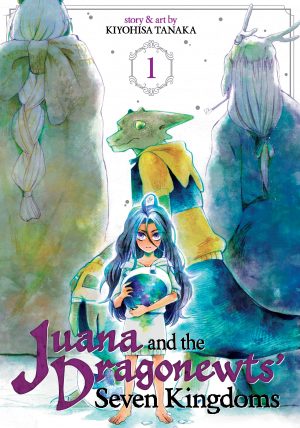 Juana and the Dragonewts' Seven Kingdoms Vol. 1
Juana and the Dragonewts' Seven Kingdoms Vol. 1By: Kiyohisa Tanaka
Translator: Adrienne Beck
Release Date: (English) January 16, 2018; (original)
Publisher: Seven Seas
Series: Juana and the Dragonewts' Seven Kingdoms
Received From: Publisher
(All reviews are our own, honest opinions.)
Rating:
I’m always looking for a new fantasy story, a genre which has been just a little bit hard to find these last few years as the isekai genre has taken over just about everything. Juana and the Dragonewts’ Seven Kingdoms by Kiyohisa Tanaka is a beautiful, fun fantasy with a lot of heart. I’ve heard it related to the Ancient Magus’ Bride, and while I’m not completely up to date with either the manga releases or the anime, I can see why. This is a fantasy story, one where a human girl, maybe the last one, finds herself amid a realm of dragon like creatures. But instead of being from the point of view of a human suddenly plunged into a fantastical world, we are given the opposite – a fantastical creature living in a fantastical world finds a human without fully knowing what it is or what to do with it.
Civilization as we currently know it has fallen. Humans no longer exist, the world now home to dragonnewts, large reptilian creatures that have built their own society. Nid is a scavenger, going into the ruins of human cities and returning with whatever curiosities he can find to sell. On one such mission he stumbles across an egg out of which a hatches a young human. Not knowing what it is or how to properly communicate with it, Nid brings it home and begins to care for it. Convinced that there must be more of Juana’s kind out in the world despite what the tales say, Nid and Juana set out on a journey to find more of her kin.
The opening of this manga might feel familiar, not reminiscent of any one work in particular, but familiar of the genre in general. There are familiar ideas aplenty – the fall of human civilization, scavenging ancient ruins, finding a thing that’s different and shouldn’t exist. But none of them are half as charming or humorous as Juana and the Dragonewts’ Seven Kingdoms.
Nid and Juana’s interactions are quite adorable, and tons of fun to read. Juana is treated as an unknown, half way as an intelligent creature and half as a pet. The pet like aspect Juana has slowly dissipates as Nid learns more about her both from old books on humans as well as regular, everyday interactions. Juana speaks Spanish, a language that Nid cannot understand and doesn’t recognize, usually talking in one or two words at a time instead of full sentences. Juana’s dialogue is left untranslated in the English edition of the manga, but with purpose. Even if the reader cannot understand the language, it’s rather easy to figure out based on context clues, something that Nid does constantly throughout the story.
The pair’s interactions are charming, heartwarming, funny, and what makes this manga so very enjoyable. Nid tries, sometimes with success, other times with failure, to communicate with Juana. Once it’s clear that they don’t understand one another’s language, Nid uses body language to communicate, the pair finally able to at least gather each other’s names. The more he learns about humans, the less he understands Juana. She most definitely hatched from an egg, but the books say that human’s don’t hatch, but have life young. Nid’s answers grow fewer, not greater, and so he sets out on a journey without a location that Juana pointed to on a map as guidance.
The world presented is an interesting one. The dragonewts have a complex society, one that has troubles of its own. Carnivores are looked down, treated ill for the possible transgressions of
their meat eating ancestors. Nid is looked down upon by the townsfolk, his past and daily life riddled with more hardships than is first apparent. And while the cities are filled with the same sort of problems every society has, the wilderness has problems of its own. The sun is strong, too strong to stay out in without protective clothing. Even hearty scales cannot prevent the sort of burns that occur without proper precaution. Severe, or at least moderate, climate collapse is hinted at here, with a sun that’s too strong and people gathered in cities with seemingly no smaller towns or villages in between.
There are still questions in regards to setting which need to be answered of course, not from lack of proper world building, but from purposeful plotting. The downfall of human civilization is a mystery even to the current denizens of the world. What they do know is told in volume one, alone with certain theories that are widely accepted. The finer details, however, are unknown, and something that, I feel, will be explored more in future volumes.
The manga leaves off on a bit of cliffhanger, and if I wasn’t already sure that I’d be continuing with this manga, I definitely would be when I reached the end.
There is a certain magic about Juana and the Dragonewts’ Seven Kingdoms, a certain heartwarming, charming feeling one gets when reading it. The story is permeated with magic, hope and understanding even with a backdrop of fallen civilization, society strife, and great knowledge that has been lost to history. This is a fantasy story, pure and simple. A story about a young girl, maybe the last of her kind, of finding family, and of understanding the unfamiliar. I truly enjoyed this story, and I can’t wait to see where Kiyohisa Tanaka is going to take us next.
Front Cover Credits – Juana and the Dragonewts’ Seven Kingdoms © Kiyohisa Tanaka 2017






Post a comment